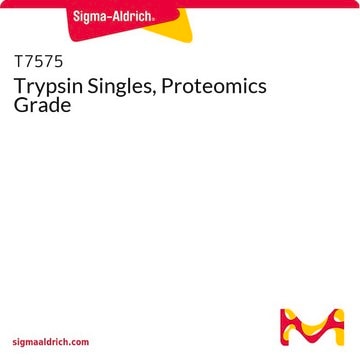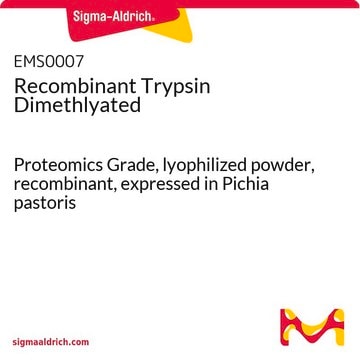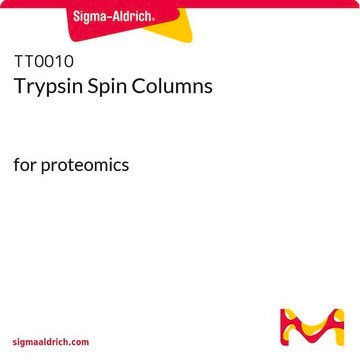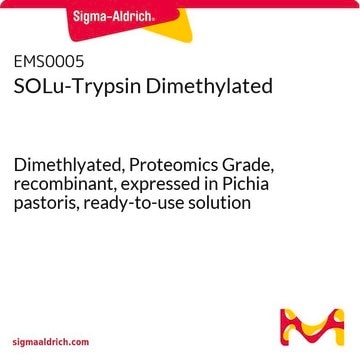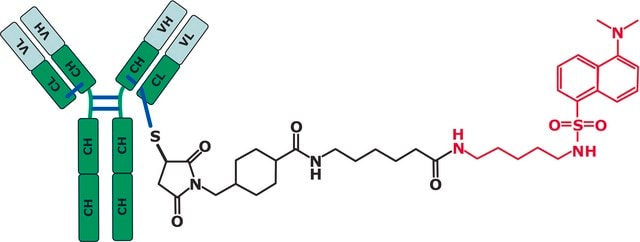Principaux documents
EMS0004
SOLu-Trypsin
recombinant, expressed in Pichia pastoris, Proteomics Grade, liquid
Synonyme(s) :
Protein Digestion for Mass Spectrometry, Ready to Use Recombinant Trypsin for Protein Digestion in Mass Spectrometry, Recombinant Trypsin for Protein Digestion in Mass Spectrometry, Trypsin for Protein Digestion, rTrypsin
About This Item
Produits recommandés
Catégories apparentées
1 of 4
Cet article | EMS0005 | UPS2 | MSST0056 |
|---|---|---|---|
| recombinant expressed in Pichia pastoris | recombinant expressed in Pichia pastoris | recombinant - | recombinant expressed in HEK 293 cells |
| form ready-to-use solution | form ready-to-use solution | form ready-to-use solution | form liquid |
| suitability suitable for mass spectrometry | suitability suitable for mass spectrometry | suitability - | suitability suitable for mass spectrometry (internal calibrator) |
| shipped in wet ice | shipped in wet ice | shipped in wet ice | shipped in dry ice |
| storage temp. 2-8°C | storage temp. 2-8°C | storage temp. −20°C | storage temp. −20°C |
Description générale
Application
Actions biochimiques/physiologiques
- SOLu-Trypsin (EMS0004) is our exclusive, Advanced Proteomics Grade enzyme that is solution-stable for mass spectrometry.
- Designed to be stable in solution when refrigerated, SOLu-Trypsin can be used immediately without preparation.
- Other forms of trypsin require thawing or reconstitution, and must be discarded if not used immediately.
- SOLu-Trypsin allows excess product to be saved for future use, thus eliminating unnecessary waste and cost.
- It is formulated with a high-purity recombinant trypsin, free of chymotryptic activity, to ensure high fidelity digestion.
Caractéristiques et avantages
- Ready to use - no preparation, such as reconstitution or thawing, is required
- Fits seamlessly into established workflow - no need to modify protocols
- Eliminates waste - remains stable in the refrigerator after use so there is no need to discard excess product
- Recombinant, porcine sequence - no chymotryptic activity
- Stable for short-term use at room temperature in an autosampler or on a liquid handling robot
Code de la classe de stockage
10 - Combustible liquids
Classe de danger pour l'eau (WGK)
WGK 1
Point d'éclair (°F)
Not applicable
Point d'éclair (°C)
Not applicable
Certificats d'analyse (COA)
Recherchez un Certificats d'analyse (COA) en saisissant le numéro de lot du produit. Les numéros de lot figurent sur l'étiquette du produit après les mots "Lot" ou "Batch".
Besoin d'un modèle de COA ?
Ceci est un modèle de certificat d'analyse (COA pour Certificate of Analysis) et peut ne pas être représentatif d'un lot récemment fabriqué de ce produit spécifique.
Déjà en possession de ce produit ?
Retrouvez la documentation relative aux produits que vous avez récemment achetés dans la Bibliothèque de documents.
Les clients ont également consulté
Articles
Evaluation of Recombinant, Chemically Treated Trypsin in Proteomics and Protein Characterization Assays
Pretreatment with Mucinase StcE increases glycopeptide identification from mucin samples, enhancing sample preparation efficiency for glycopeptide analysis.
Pretreatment with Mucinase StcE increases glycopeptide identification from mucin samples, enhancing sample preparation efficiency for glycopeptide analysis.
Pretreatment with Mucinase StcE increases glycopeptide identification from mucin samples, enhancing sample preparation efficiency for glycopeptide analysis.
Notre équipe de scientifiques dispose d'une expérience dans tous les secteurs de la recherche, notamment en sciences de la vie, science des matériaux, synthèse chimique, chromatographie, analyse et dans de nombreux autres domaines..
Contacter notre Service technique